外研版英语八年级上册 Module 1 How to learnEnglish模块综合检测 (I)卷
- 格式:doc
- 大小:179.01 KB
- 文档页数:10

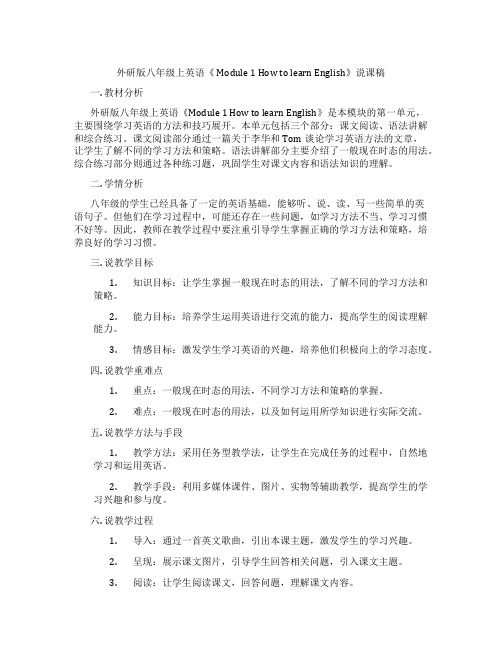
外研版八年级上英语《 Module 1 How to learn English》说课稿一. 教材分析外研版八年级上英语《Module 1 How to learn English》是本模块的第一单元,主要围绕学习英语的方法和技巧展开。
本单元包括三个部分:课文阅读、语法讲解和综合练习。
课文阅读部分通过一篇关于李华和Tom谈论学习英语方法的文章,让学生了解不同的学习方法和策略。
语法讲解部分主要介绍了一般现在时态的用法。
综合练习部分则通过各种练习题,巩固学生对课文内容和语法知识的理解。
二. 学情分析八年级的学生已经具备了一定的英语基础,能够听、说、读、写一些简单的英语句子。
但他们在学习过程中,可能还存在一些问题,如学习方法不当、学习习惯不好等。
因此,教师在教学过程中要注重引导学生掌握正确的学习方法和策略,培养良好的学习习惯。
三. 说教学目标1.知识目标:让学生掌握一般现在时态的用法,了解不同的学习方法和策略。
2.能力目标:培养学生运用英语进行交流的能力,提高学生的阅读理解能力。
3.情感目标:激发学生学习英语的兴趣,培养他们积极向上的学习态度。
四. 说教学重难点1.重点:一般现在时态的用法,不同学习方法和策略的掌握。
2.难点:一般现在时态的用法,以及如何运用所学知识进行实际交流。
五. 说教学方法与手段1.教学方法:采用任务型教学法,让学生在完成任务的过程中,自然地学习和运用英语。
2.教学手段:利用多媒体课件、图片、实物等辅助教学,提高学生的学习兴趣和参与度。
六. 说教学过程1.导入:通过一首英文歌曲,引出本课主题,激发学生的学习兴趣。
2.呈现:展示课文图片,引导学生回答相关问题,引入课文主题。
3.阅读:让学生阅读课文,回答问题,理解课文内容。
4.讲解:讲解一般现在时态的用法,让学生通过例句理解并掌握。
5.练习:让学生进行语法练习,巩固对一般现在时态的掌握。
6.交流:分组讨论,让学生分享自己的学习方法和策略,互相学习。

八年级英语外研版(上)Module 1 How to learn English重点词汇句型。
1 .give you some advice给你一些建议(advice 不可数名词)2 .讲…语(speak +语言)3.tell sb. about sth. 告诉某人关于某事4.talk to sb.对某人谈话5.read+文字类物;look与at 连用, have a look3. how (what) about doing sth 做什么怎么样4. ask (sb.) for sth. 请求某人获得……6.have a message(短信,信息) for sb. 有某人的信息/ give sb. a message给某人一条信息/ take a message for sb. 捎某人一个口信leave a message for sb. 给某人留个口信7. help sb with sth=help sb. to do sth.在某方面帮某人8.translate sth. into sth.把……翻译成……9.send sth to sb=send sb. sth. 把某物寄(送)给某人10.match sth. with sth. 把某物与某物搭配11.不定代词,疑问副词(something, nothing, anything, everything,what)接else表其他某物12. enjoy (doing) sth 享受(做)某事13.take a long time 花很长一段时间14.start a conversation 开始谈话15. take a deep breath 深呼吸一下16. a piece of paper一张纸17. best wishes给予最好的祝愿18. the number of sth. 某物的数量(后接动词单数)19. a number of sth.许多某物(后接动词复数)20. show / take sb. around 带某人参观21.write down sth. 写下22.make mistakes 犯错23.do some concerts开音乐会24.on the Internet 在网上25. a good idea 一个好主意26. first of all= at first 首先27. what else 还有其他什么28. a piece of advice 一条建议29. borrow sth. from sb. 从某人借入某物lend sth. to sb.借某物给某人30.the best way to do sth. 做……的最好方法41. make friends 结交朋友42.think about sth./ doing sth. 考虑, think of sth. / doing sth. 想出43. It takes +时间/ 金钱+to do sth. 做某事花费多少时间或金钱44. practise (doing) sth.练习(做)某事45. be good at( doing )sth.擅长于(做)某事46. a piece of paper一张纸,纸不可数47. It is + adj.(形容词)+ to do sth.做某事是怎么样的48.smile at sb.向某人笑49.hear from sb. = get a letter from sb. 收到某人的来信, hear of sb. / sth. 听说某人或某物hear about sb./ sth. 听说关于某人或某物建议句型:1. You should (not )do(原形) sth.你应该(不)做……2. Why don't you do(原形)sth.=Why not(原形)do sth.你为什么不做… / 为什么不做…3. How about doing sth. = What about doing sth. 做……怎么样4 . It's a good idea to do(原形)sth. 做某事是一个好主意半功5 . try to do (原形)sth. 试图做某事6 . try not to do(原形) sht.试图不做某事7. remember to do (原形)sth. 记得做某事8. Don't forget to do (原形)sth.不要忘记做某事9. It is a good way to do (原形)sth. 做某事是一个好方法/方式.提升训练一、根据句意及首字母或汉语提示完成单词。

初二英语上册(外研版)Module 1 How to learn English?知识点总结一、重点词汇·原文再现Work in pairs.结对练习。
·基本用法pair n. (相关的)两个人,一对a pair of 一双,一对in pairs 成双的,成对的How I wish for a pair of wings!我多么希望有一双翅膀!Please read the dialogue in pairs.请两人一起读对话。
·原文再现Correct the spelling.改正拼写。
·基本用法correct vt. 改正;纠正,其后可以直接跟宾语(过去式: corrected 过去分词: corrected现在分词: correcting 第三人称单数: corrects) She has corrected the mistakes in the report.她修改了报告里的错误。
2. correct adj. 正确的,对的Your answer to the question is correct.你对这个问题的回答是正确的。
·原文再现Correct the spelling.改正拼写。
·基本用法spelling n. 拼写Don't make a mistake in your spelling.不要在拼法上出错。
·知识拓展--相关单词spell v. 拼写I don't know how to spell your name.我不会拼写你的名字。
·原文再现Listen and check the words you hear.听并检查听到的单词。
·基本用法word n. 单词Take care to spell every word right.注意把每个词拼正确。
·原文再现Practise saying the words.练习说单词。

Module 1 How to learn English知识总结常见搭配:take/follow one’s advice接受某人的建议ask for advice 征求意见拓展:advise vt.建议常见搭配:advise sb. to do sth.e.g.My teacher advises me to leave now.老师建议我现在就离开。
2.Each time you will learn something new. I also advise you to talk about the films or songs with your friends. 每次你将会学习一些新东西。
我也建议你和朋友们谈论电影或歌曲。
time的用法:(1)time指“时间”用作不可数名词,前面可much, little, a lot of, plenty of等修饰。
(2)当作“次数;倍数”讲时,time是可数名词。
e.g.I have been to Beijing three times.(3)time构成的短语:at a time一次,每一次at one time曾经,一度at times /from time to time有时,偶尔all the time总是,一直in time及时,迟早on time准时(4)time构成的句型:①It’s time for sb. to do sth./It’s (high) time sb. did sth.该是某人干……的时间了。
e.g. It’s time for children to go to bed.是小孩睡觉的时候了。
It’s high time that we started.我们该出发了。
②each time(每次),next time(下次),the first/last time(第一次/最后一次……的时候)等。
e.g. The last time I went to China, I visited Shanghai. 我上次到中国时,游览了上海。

Module 1 How to learn English 一、短语归纳1.look up 查找2.make a mistake 犯错误3.talk about 谈论,讨论4.speak English 讲英语5.write down 写下,记下6.next to 在……旁边7.listen to the radio 听广播8.be good for 对……有好处9.write to 给……写信10.a little 有点11.agree with sb. 同意某人12.talk to 跟……交谈13.send sth. to sb. 把某物发(送)给某人14.ask for 请求15.watch films 看电影16.be from 来自17.smile at 冲……微笑18.go to bed 去睡觉19.get up 起床20.think about 考虑21.make friends with sb. 与某人交朋友22.take sb. around 带某人参观23.a few 几个,一些24.invite sb. to 邀请某人到……25.be good at 擅长26.for example 例如二、基础知识归纳1.practise (动词)练习;实习。
后面多跟名词(词组)或v-ing形式作宾语。
(1)Listen!Someone is practising playing the guitar.(2)How can I practise speaking English?practice (不可数名词)练习;实践。
(3)Practice makes perfect. 熟能生巧。
2. look up查找(强调在词典、参考书等工具书中查询)(1)We can look it up in a dictionary.(2)It is unnecessar y to look up every word you don’t know in the dictionary while your are reading.look up还有:抬头看、向上看;仰视的意思。
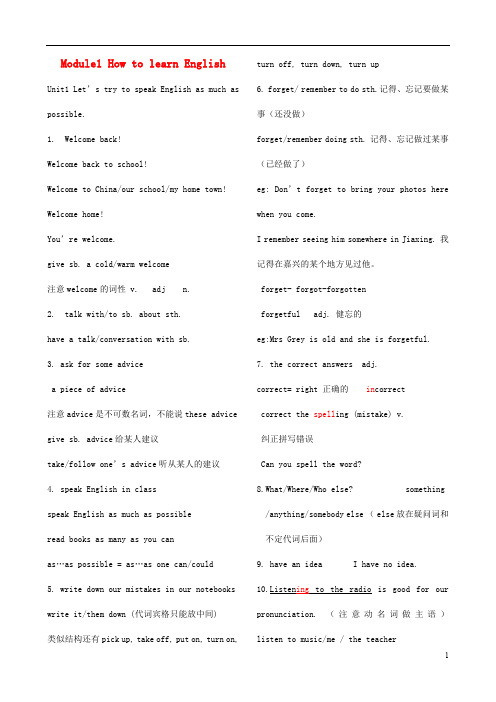
Module1 How to learn English Unit1 Let’s try to speak English as much as possible.1. Welcome back!Welcome back to school!Welcome to China/our school/my home town! Welcome home!You’re welcome.give sb. a cold/warm welcome注意welcome的词性 v. adj n.2. talk with/to sb. about sth.have a talk/conversation with sb.3. ask for some advicea piece of advice注意advice是不可数名词,不能说these advice give sb. advice给某人建议take/follow one’s advice听从某人的建议4. speak English in classspeak English as much as possibleread books as many as you canas…as possible = as…as one can/could5. write down our mistakes in our notebooks write it/them down (代词宾格只能放中间)类似结构还有pick up, take off, put on, turn on, turn off, turn down, turn up6. forget/ remember to do sth.记得、忘记要做某事(还没做)forget/remember doing sth. 记得、忘记做过某事(已经做了)eg: Don’t forget to bring your photos here when you come.I remember seeing him somewhere in Jiaxing. 我记得在嘉兴的某个地方见过他。
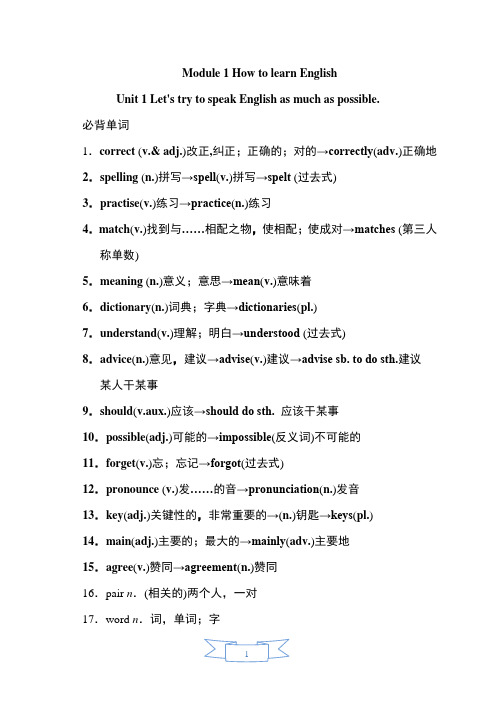
Module 1 How to learn EnglishUnit 1 Let's try to speak English as much as possible.必背单词1.correct (v.& adj.)改正,纠正;正确的;对的→correctly(adv.)正确地2.spelling (n.)拼写→spell(v.)拼写→spelt (过去式)3.practise(v.)练习→practice(n.)练习4.match(v.)找到与……相配之物,使相配;使成对→matches (第三人称单数)5.meaning (n.)意义;意思→mean(v.)意味着6.dictionary(n.)词典;字典→dictionaries(pl.)7.understand(v.)理解;明白→understood (过去式)8.advice(n.)意见,建议→advise(v.)建议→advise sb. to do sth.建议某人干某事9.should(v.aux.)应该→should do sth. 应该干某事10.possible(adj.)可能的→impossible(反义词)不可能的11.forget(v.)忘;忘记→forgot(过去式)12.pronounce (v.)发……的音→pronunciation(n.)发音13.key(adj.)关键性的,非常重要的→(n.)钥匙→keys(pl.)14.main(adj.)主要的;最大的→mainly(adv.)主要地15.agree(v.)赞同→agreement(n.)赞同16.pair n.(相关的)两个人,一对17.word n.词,单词;字18.complete v.把……填完整;使完全19.grammar n.语法20.letter n.字母21.aloud adv.大声地;出声地22.excellent adj. 极好的;优秀的必背短语23.look up 查;查找24.make a mistake 犯错误25.agree with sb.同意某人26.get to do sth. 逐渐做某事必背句子27.Let's try to speak English as much as possible.咱们尽量尽可能多地说英语。

Module 1 How to learn EnglishUnit 1Let's try to speak English as much as possible.知识讲解知识点1 Practise /'præktIs/ v. 练习、训练考向一【重点】practise+名词、代词、动名词,不能接不定式。
eg:They're practising singing the new song. 他们正在练习唱那首新歌。
注意practice名词“练习”一般为不可数名词。
在英国英语中,practise v.和practice n.在美国英语中,practise和practice都可以是v.或n.考向二【易错点】practise后跟动名词作宾语,类似的动词(短语)还有:finish enjoy suggest keep mind miss avoidlook forward to have trouble in典例Before she went abroad, she spent as much time as she could___ English.A.to practise to speakB. practising speakingC. to practise speakingD. practising to speak【点拨】在她出国之前,她用了尽可能多的时间练习说英语。
这里考查两个动词的搭配。
第一个,spend time on sth./in doing sth.中in可省略,花时间在某事上/做某事:第二个practise后接动名词,不接不定式。
考向三【重点】practise与exercise的辨析practice:有规律地练习,特指反复练习。
eg:He practises English every day.他每天练习英语。
exercise:指训练,锻炼,操练。
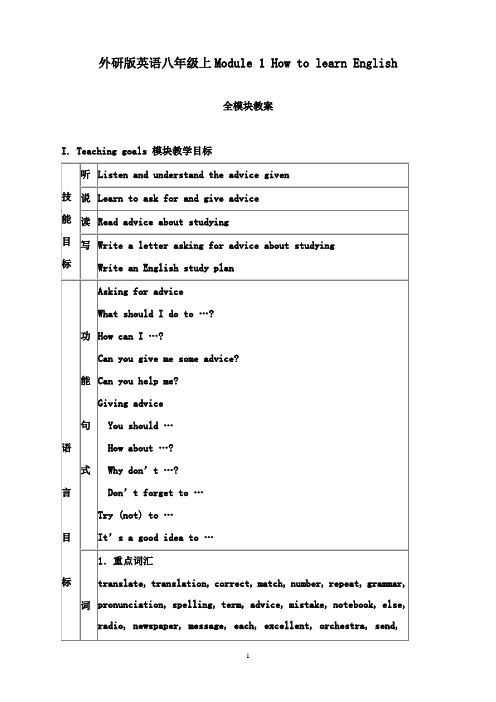
外研版英语八年级上Module 1 How to learn English全模块教案I. Teaching goals 模块教学目标II. Teaching material analyzing 教材分析本模块以“How to learn English”为话题,以学习征求建议、提出建议的方法为主线,介绍了单词分类记忆、根据上下文判断词义;听力细节辨认、反向推理;略读等学习方法。
通过模块学习,学生除了能掌握上述英语学习方法之外,还可以根据同学的建议制定更适合自己的学习计划;同时,模块也复习了一般现在时、现在进行时、一般过去时、一般将来时的用法。
Unit 1 通过听、读、说训练,初步学习给别人提建议的方法。
其中活动1要求将所给表示学习活动的词汇分类;活动2要求根据录音判断对话主题;活动3—5听读包含建议的对话并完成填表、答问等任务。
活动6学习英语中的连读法;活动7根据提示口头练习给别人提建议的方法。
Unit 2 通过读、写训练,学会向别人征求建议或给别人提出建议。
其中活动1要求学生列举自己在语言学习活动中遇到的实际困难。
活动2—4要求学生阅读一语言学习网站“问答专栏”中内容后完成补全句子、回答问题等练习。
活动5—6要求学生根据自己的学习实际,完成一封求助信并征求同学的建议。
Unit 3 对“提供学习建议”的功能项目进行综合训练,并在此基础上完成制定学习计划的任务。
其中活动1、2 要求听取Charlie和Mary的对话,选出所听到的表示建议的句式并完成问答练习。
活动3—5 要求根据所供图片,描述、评论Jack的学习、生活情况,并根据提示问题提出建议。
活动6要求阅读 Helen的问题并用所供表达完成Simon的回信。
活动7—9是词汇的拓展训练:其中7要求根据图片写出单词;8用所供词汇组成短语;9用所供词汇完成句子。
Around the world给学生介绍了通过多种渠道学习英语的方法。
Module task要求学生反思自己的英语学习,通过图标明晰信息,并根据图标信息制定学习计划;然后小组交流,提出修改建议。
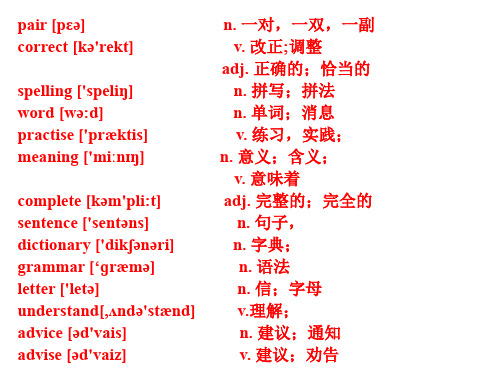

八年级外研版上册Module 1 How to learn English Free talk:Ask and answer:1.Do you enjoy learning English?2.Why do you learn English ?3.Do you think English is useful ?4.How to learn English well ?Preview:1.Which do you think is difficult for you about learning English ?2.Match the words with Chinese.Answer 回答ask 检查Listen 看Look 问Check 说Read 写Say 翻译Translate 听Write 阅读Presentation:1、words and expressionspair[peə] n.(相关)的两个人,一对correct[kə'rekt]v.改正;纠正correct[kə'rekt]adj.正确的;对的spelling['spelɪŋ]n.拼写word[wɜːd] n.词;单词;字practise['præktɪs]v.练习match[mætʃ]v.找到与……相配之物,使相配;使成对meaning['miːnɪŋ]n.意义;意思complete[kəm'pliːt]v.把……填完整;使完全sentence['sentəns]n.句子dictionary['dɪkʃənərɪ]n.词典;字典grammar['græmə]n.语法letter['letə]n. 字母look up查;查找mistake [mɪ'steɪk]n.错误;过错make a mistake犯错误understood[ˌʌndə'stʊd]v.理解;明白advice[əd'vaɪs]n.意见;建议should[ʃʊd] v.aux.应该possible['pɒsɪbəl]adj.可能的write down写下;记下notebook['nəʊtbʊk]n.笔记本forget[fə'get]v.忘;忘记forgot [fə'gɒt]v.忘;忘记pronounce[prə'naʊns]v.发……的音aloud[ə'laʊd]adv.大声地;出声地radio ['reɪdɪəʊ] n.电台;广播pronunciation[prəˌnʌnsɪ'eɪʃən]n.发音key[kiː]adj.关键性的,非常重要的main[meɪn] adj.主要的;最大的excellent['eksələnt]adj.极好的;优秀的agree [ə'griː]v.赞同agree with sb.同意某人vocabulary [vəʊ'kæbjʊlərɪ] n.词汇;词汇量ask for请求(给予)improve[ɪm'pruːv]v.改进;改善basic['beɪsɪk]adj.主要的;基础的time[taɪm]n.次;回advise[əd'vaɪz]v.向……提出意见;忠告;建议shy [ʃaɪ] adj.羞怯的;腼腆的conversation[ˌkɒnvə'seɪʃən]n.谈话;交谈quickly['kwɪklri]adv.快地;迅速地natural['nætʃərəl]adj.合理的;合乎常情的suggest[sə'dʒest]v.建议;提议place[pleɪs]v.放置2、Listen and readMs James: Welcome back, everyone! Today, we’re going to talk about good ways to learn English. Ready? Who has some advice?Lingling: We should always speak English in class.Ms James: Good! Let’s try to speak English as much as possible.Daming: Why not write down the mistakes in our notebooks?Ms James: That’s a good idea. And don’t forget to write down the correct answers next to the mistakes. What else?Lingling: It’s a good idea to spell and pronounce new words aloud every day.Ms James: Thanks a lot, Lingling. How about listening to the radio?Lingling: Yes, that’s good for our pronunciation too. But there are so many new words.Ms James: You don’t need to understand every word. You just need to listen for key words and main ideas.Daming: That’s the same for reading. English stories are so interesting. I get to know a lot about the world through reading.Lingling: I think writing is also important. Why don’t we try to find some English pen friends? We can write to them.Ms James: Excellent! I agree with you.。
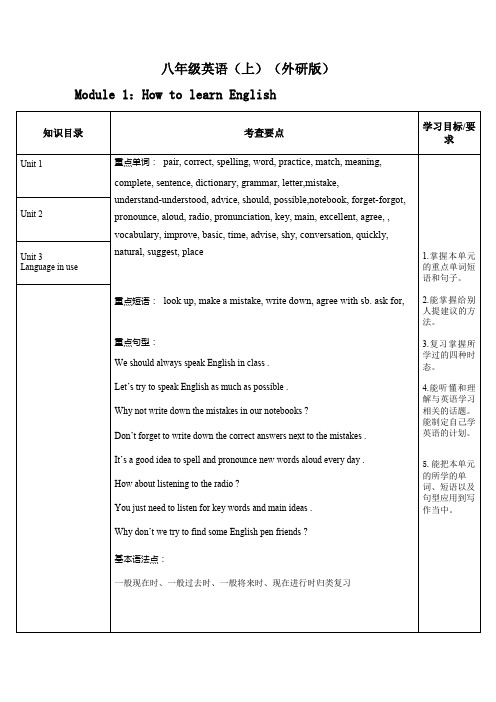
八年级英语(上)(外研版)Module 1:How to learn English·【易错题举例】【例1】:1.【2013江苏南京】—Millie, where is Miss Li?—She a speech on Chinese art to the first-year students in the hall.A. givesB. gaveC. is givingD. has given【答案】C【解析】试题分析:由问句“李老师在哪里?”可知应使用现在进行时,表示李老师现在正在做什么,所以选择答案C。
【例2】:2.---Let’s go fishing if it ________this weekend.---But nobody knows if it ___________.A. is fine; will rainB. will be fine; rainsC. is fine; rainsD. will be fine ;will rain【答案】A【解析】试题分析:句意:——如果这个周末天气好,我们去钓鱼吧。
——但是没有人知道是否会下雨。
第一空If表示“如果”,引导条件状语从句,用一般现在时表示一般将来时,故第一空用一般现在时,排除CD两项。
第二空if表示是否,引导了一个宾语从句,故结合句意,表示将来,故用一般将来时。
故选A。
【例3】:3.【2014年江苏省南通市中考】─Jack to take part in Oxfam Trailwalker in Hong Kong.─Oh,that’s why he is packing his clothes.A.wentB.was goingC.has goneD.is going【答案】D【解析】试题分析:句意:--杰克将要参加香港的乐施毅行者大会。
--哦,那就是他正在打包衣服的原因。
根据that’s why he is packing his clothes可知他正在打包衣服,说明他将要去参加乐施毅行者大会。
外研版英语八年级上册 Module 1 How to learnEnglish模块综合检测(I)卷姓名:________ 班级:________ 成绩:________一、单项选择 (共10题;共20分)1. (2分)We should often ________ English in class.A . speakingB . to speakC . speakD . /2. (2分)It ______ the workers about 20 months to build the Huhang highspeed railway.A . tookB . spentC . costD . paid3. (2分)Did it _______ you half an hour _______ this newspaper?A . take; to readB . cost; to readC . use; to readD . take; reading4. (2分)— Why are you in such a hurry, Mike?— There ________ an NBA basketball game in ten minutes.A . will haveB . will beC . is going to haveD . are going to be5. (2分)I can't answer this question,so I want to ask my teacher ______ help.A . withB . inC . toD . for6. (2分)Say ________ to your parents when you leave home to go to school.A . helloB . yesC . sorryD . goodbye7. (2分)If you don't know the meaning of the word, try to ______ it.A . repeatB . guessC . smileD . count8. (2分)It's not easy for me ________ English well.A . studyB . studyingC . to studyD . studies9. (2分)—Why didn't your sister talk with me?—She is a _______ girl. She is afraid of speaking before strangers (陌生人).A . goodB . happyC . shyD . clever10. (2分)Our teacher advises us exercise to keep healthy.A . doB . to doC . doing二、完形填空 (共1题;共10分)11. (10分)完形填空In learning English,one should first pay attention to listening and speaking. It is the groundwork of reading and writing. You'd better 1 your best to speak while youdo much listening. Don'tbe 2 of making mistakes. But be careful not to let them stop you from improving your 3 . While you are doing this, a good 4 is to write—keep a diary, write notes or letters. Then if you can, ask some others to go through 5 you have written and tell you where it is wrong. Many mistakes in your speaking will be 6 found when you write. Through correcting mistakes, you can do better in learning English. If you are slowin speaking, don't 7 about it. One of the helpful ways is reading, either aloud or to yourself. The important thing is to choose 8 interesting to read. It can't be too difficult for you. When you are reading 9 this way, don't stop to 10 the new words if you can guess their meanings when they have nothing to do with the sentences. You can do that some othertime.(1)A . haveB . sendC . makeD . try(2)A . sureB . afraidC . proudD . tired(3)A . EnglishB . ChineseC . KoreanD . French(4)A . start .B . ideaC . wayD . manner(5)A . howB . whenC . whyD . what(6)A . happilyB . easilyC . reallyD . slowly (7)A . talkB . fearC . worryD . hurry (8)A . somethingB . everythingC . anythingD . nothing (9)A . byB . onC . atD . in(10)A . look atB . look forC . look upD . look over三、阅读理解 (共1题;共8分)12. (8分)阅读理解There are about fifteen hundred languages in the world. But only a few of them are very important. English is one of them. Many, many people use it, not only in England and the USA, but also in other parts of the world. About 200, 000, 000 people speak it as their own language. It is difficult to say how many people are learning it as a foreign language. Millions of people are trying to do so. Is it easy or difficult to learn English? Different people may have different answers. Have you ever noticed ads(广告) of this kind in the newspapers or magazines? "Learn English in six weeks, or give your money back. . . " "Easy and funny. . . " "Our records and tapes help you master English in a month."Of course, it never happened quite like that.The only language that seems easy to learn is the mother tongue. We should remember that we all learned our own language well when we were children. If we could learn English in the same way, it would not seem so difficult. Think of what a small child does. He listens to what people say. He tries what he hears. So it is hard to say that learning English is easy. We must do a lot of practice. And practice needs great efforts(努力) and takes much time. Good teachers, records, tapes, books, and dictionaries will be helpful, but they cannot do the student's work for him.(1)How many languages are very important in the world?A . Few.B . A few.C . Many.D . Little.(2)Which countries use English as the mother tongue?A . China and France.B . Japan and Italy.C . Germany and France.D . England and America.(3)Which language is easy to learn?A . English.B . Chinese.C . Japanese.D . The mother tongue.(4)If we want to learn English well, what shall we do?A . We should study it without any help.B . We must do a lot of practice.C . We need to get much money back.D . We must live in England or America.四、填空题 (共2题;共15分)13. (10分)根据句意及首字母提示补全单词或短语。